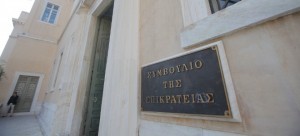The Council of State on Tuesday ruled that the changes made by former education minister Nikos Filis in religion lessons are unconstitutional and contrary to the basic principles of the European Convention of Human Rights.
The decision came after an appeal made by the Holy Metropolis of Piraeus and other institutions challenged the changes made by the former education minister.
The plenary of Greece’s highest administrative court published its decision (660 of 2018). The session was chaired by the President of the Council of State, Nikos Sakellariou and rapporteur the State Counselor Efthymios Antonopoulos. The ruling annulled the contested ministerial decision and the changes in the teaching of religion classes for primary and secondary school, and there is another appeal pending for high school.
In particular, the Judges decided that the former minister’s changes are contrary to Article 16 of the Constitution, which states that education is a basic mission of the state, and among its aims is the development of national and religious consciousness. The development of the Christian Orthodox consciousness in the mainstream religion of the Eastern Orthodox Church of Christ is imposed by the Constitution.
It was also ruled that the ministerial decision was contrary to Article 13 of the Constitution, which enshrines the freedom of religious consciousness to be inviolable, since the contested decision was directed exclusively at Christian Orthodox students. The teaching of religion lessons is also aimed at consolidating the Christian Orthodox faith as it is from the context of family life and the student’s environment prior to schooling.
The judges argued that the teaching of religion introduced by the contested ministerial decision is likely to affect the sensitive mental world of students who do not have the critical perception of adults and divert them from the Christian Orthodox consciousness.
Filis’ changes were found to directly affect the First Additional Protocol of the European Court of Human Rights. This is because it deprives students of Christian Orthodox doctrine of the right to be taught exclusively the doctrines, moral values and traditions of the Eastern Orthodox Church of Christ, while the law provides for Roman Catholic, Jewish and Muslim students to be taught their respective religion lessons independently.
Source: greekreporter
Ask me anything
Explore related questions





